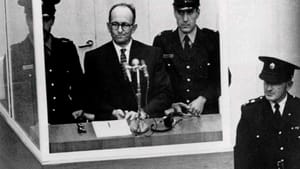Stay in the Loop
BSR publishes on a weekly schedule, with an email newsletter every Wednesday and Thursday morning. There’s no paywall, and subscribing is always free.
The Nazis are back
Chris Weitz's 'Operation Finale'

Chris Weitz’s film Operation Finale--about the capture and subsequent trial of Adolf Eichmann, the man who organized the mass murder of Hungary’s Jews – finds itself fascinatingly, disturbingly au courant in 2018.
Neo-Nazis are back again, from Charlottesville, Virginia, where they marched a year ago in one of the more egregious nadirs of the Trump presidency, to Chemnitz in Saxony, where they turned out in force a few days ago. At the same time, the public lovefest between Trump and Netanyahu embarrasses liberal Jews and fuels anti-Zionist canards about Israel being a “fascist” state. The Israelis could use a little favorable publicity, and the world a reminder about who the Nazis were and potentially still are.
Turning point
The Eichmann trial was a turning point in Holocaust history, focusing global attention on the Final Solution as the postwar Nuremberg Trials had not. At the same time, it raised troubling issues of law and ethics.
The Nuremberg Trials, whose own legality as a victors’ court was questioned, were long since concluded. An Israeli court could hardly claim impartiality or jurisdiction. Eichmann was kidnapped -- not extradited — from Argentina, where he took refuge.
Israel was not a state when his crimes were committed, and it could speak only on behalf of the “Jewish people,” a controversial term then as now. If his acts were beyond serious question, how and by whom they could be legitimately punished was a different matter.
Beyond that, the disparity between the real subject of the trial—the Holocaust—and the single, shabby figure in the dock was glaring. The point struck one observer, Hannah Arendt, who coined the phrase “banality of evil” to describe the effect of such disproportion on the moral imagination.
Out of focus
Weitz’s thriller is not concerned with these heady matters. It focuses instead on the Mossad's successful mission to kidnap Eichmann. The result is a boggy mess lacking narrative coherence and suspense. Thereby, it allows the last character whose show it should be—Eichmann, portrayed by Ben Kingsley—to steal it straight out from the supposed good guys.

Kingsley’s Eichmann, lionized by local Nazis who found a welcome home in Argentina, keeps a low profile as a factory foreman living under an assumed name. When finally captured, he pretends to be a Jew, and only confesses his identity when it’s clear he can’t conceal it.
The agent behind his abduction, Peter (Oscar Isaac, the film’s top-billed star), tries to get him to sign a form declaring that his departure for Israel is voluntary. How such a form signifies actual consent to a kidnapping is left a mystery.
After extracting the details of Peter’s own personal Holocaust loss, Eichmann signs the form he can, of course, easily repudiate, then savagely mocks Peter’s pain. The result of this scene is exceedingly distasteful: the evil Nazi manipulates the hapless Jew who is his nominal captor, turning him into another victim.
Jury's out
Along the way, one plot point after another gets dropped. When the Mossad crew finally makes its getaway, the car taking them to their airport flight turns out to be too small, and one member, Rossi (comedian Nick Kroll) volunteers to stay behind, only to turn up back in Israel unharmed.
Peter, in a clumsy reprise of the climactic scene from Ben Affleck’s Argo, is also left behind as the flight takes off, but somehow turns up safe and sound. On the other hand, Sylvia (Haley Lee Richardson), the young girl who pointed the way to Eichmann, seems abandoned to her fate as the Nazis torture her; even tender-hearted Peter can’t seem to spare a tear for her.
Bound and blindfolded, Kingsley’s Eichmann remains the scornful embodiment of the Master Race, triumphing over his captors even as they pronounce their justice on him. You can’t blame a fine actor for running away with a villain’s role. But Arendt’s essential insight—and that of Christopher Browning, in his celebrated study of Nazi executioners—was that great evil is often done by ordinary men.
Whether Eichmann deserved a better trial or one at all, is a matter for debate. The subject he represents certainly deserved a better movie.
What, When, Where
Operation Finale. Written by Matthew Orton, Chris Weitz directed. Philadelphia area showtimes.
Sign up for our newsletter
All of the week's new articles, all in one place. Sign up for the free weekly BSR newsletters, and don't miss a conversation.

 Robert Zaller
Robert Zaller